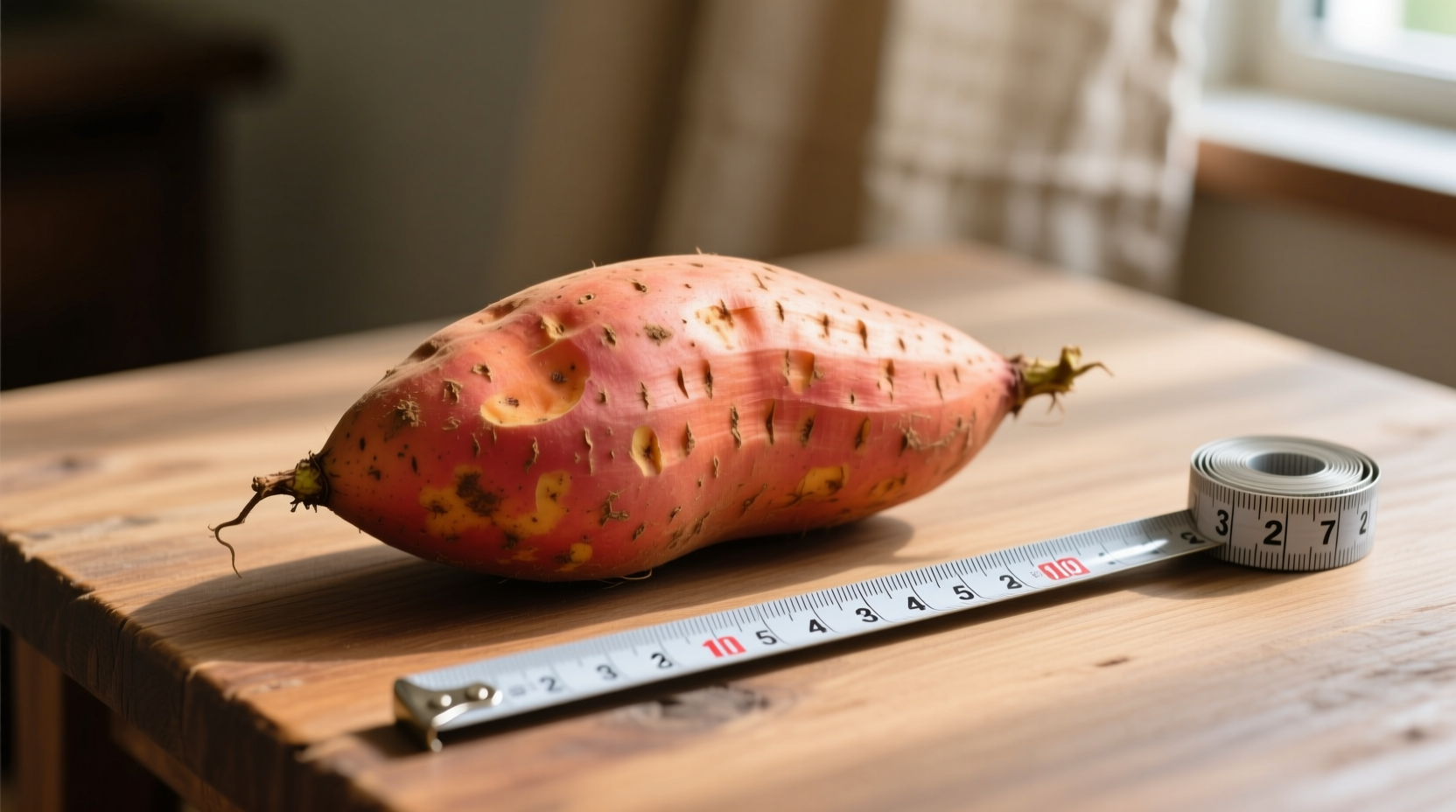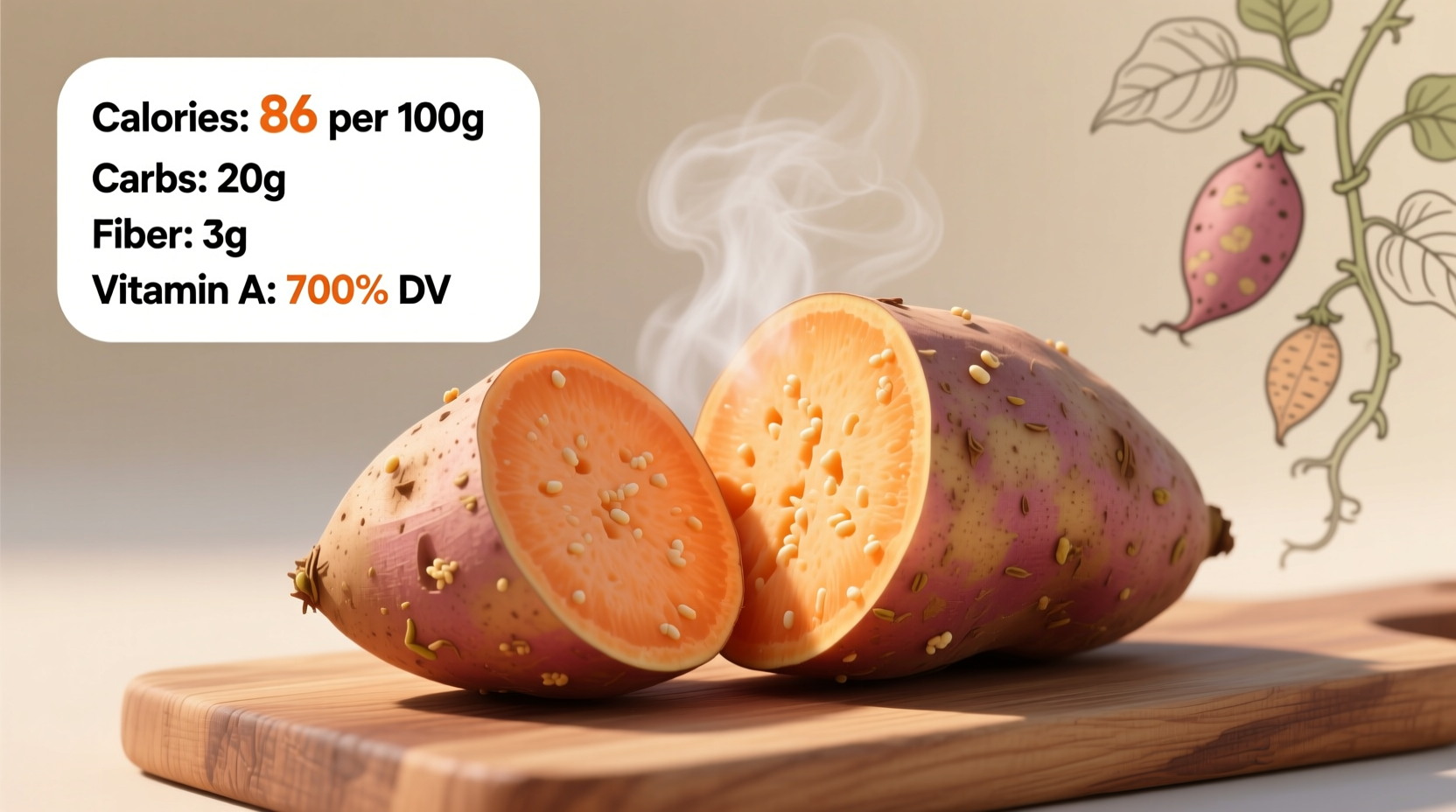A medium-sized sweet potato (approximately 130g) contains about 103 calories when baked with skin. This nutrient-dense root vegetable offers complex carbohydrates, fiber, and essential vitamins while remaining a moderate-calorie food option for balanced diets.
Understanding the precise calorie content of sweet potatoes is crucial for anyone tracking nutritional intake, whether for weight management, athletic performance, or general health awareness. Unlike simple calorie counters might suggest, the actual energy content varies significantly based on preparation method, size, and even variety of sweet potato.
What Determines Sweet Potato Calorie Count?
The calorie content in sweet potatoes isn't fixed—it changes based on several factors that directly impact your nutritional calculations. Let's examine what really matters when counting these calories.
Raw vs. Cooked: The Water Content Factor
Raw sweet potatoes contain about 86% water, but cooking methods dramatically alter this ratio. As water evaporates during cooking, the remaining nutrients become more concentrated. This explains why 100g of raw sweet potato has 86 calories, while the same weight after baking jumps to 90 calories.
| Preparation Method | Calories per 100g | Water Content | Key Nutrient Changes |
|---|---|---|---|
| Raw | 86 | 86% | Maximum vitamin C retention |
| Baked with skin | 90 | 77% | Beta-carotene increases 300% |
| Boiled | 81 | 82% | Some water-soluble vitamins leach into water |
| Fried | 131 | 65% | Added fat increases calories significantly |
This nutritional transformation during cooking represents a critical consideration for accurate calorie tracking. According to USDA FoodData Central, the standard medium sweet potato (130g) contains 103 calories when baked, but only 85 calories when boiled. The difference comes down to water loss during baking concentrating the natural sugars.
Portion Size Reality Check
Many people miscalculate sweet potato calories because they don't recognize standard serving sizes. A true medium sweet potato (about 5 inches long) weighs approximately 130g—much smaller than what many grocery stores sell today.

When selecting sweet potatoes at the store, look for ones that fit comfortably in your palm—that's typically the 130g size used in nutritional databases. Larger specimens can easily double or triple the calorie count without you realizing it.
Nutritional Value Beyond Calories
Sweet potatoes deliver exceptional nutritional density relative to their calorie content. One medium sweet potato provides:
- 438% of your daily vitamin A needs (as beta-carotene)
- 37% of vitamin C requirements
- 29% of manganese needs
- 16% of potassium requirements
- 3.8g of dietary fiber (15% of daily needs)
Unlike simple carbohydrates, sweet potatoes have a moderate glycemic index of 44-61 depending on preparation method. This means they release energy gradually rather than causing blood sugar spikes, making them suitable for most dietary approaches when portion-controlled.
Smart Incorporation into Your Meal Plan
Understanding how to work sweet potatoes into your existing nutrition plan prevents common pitfalls. Consider these practical strategies:
For Weight Management
Substitute sweet potatoes for refined carbohydrates rather than adding them to your existing diet. Replace one serving of white rice, pasta, or bread with a medium sweet potato to maintain similar calorie intake while dramatically improving nutrient density.
For Athletes and Active Individuals
Time your sweet potato consumption around workouts. Consuming a medium sweet potato 1-2 hours before exercise provides sustained energy, while eating it within 45 minutes after exercise helps replenish glycogen stores more effectively than many commercial recovery products.
For Blood Sugar Management
Pair sweet potatoes with healthy fats and protein to further moderate blood sugar response. Try baked sweet potato with a tablespoon of almond butter or boiled sweet potato in a salad with grilled chicken and avocado.
Common Misconceptions Clarified
Several myths persist about sweet potato nutrition that deserve clarification based on current research:
Myth: Sweet potatoes are too high in sugar for healthy eating
Fact: While sweet potatoes contain natural sugars, their high fiber content (3.8g per medium potato) significantly slows sugar absorption. The fiber-to-sugar ratio makes them appropriate for most dietary patterns.
Myth: All sweet potato varieties have identical nutrition
Fact: Orange-fleshed varieties (most common in US) are highest in beta-carotene, while purple varieties contain different antioxidants like anthocyanins. White-fleshed varieties have slightly lower sugar content.
According to a 2023 review published in the Journal of Food Composition and Analysis, the nutritional profile of sweet potatoes varies not only by color but also by growing conditions and storage time. Properly stored sweet potatoes (in cool, dark place) maintain nutritional value for 3-5 weeks, while refrigeration can actually increase sugar concentration.
Practical Application Guide
Here's how to apply this information in real-world scenarios:
Daily Tracking Made Simple
When logging sweet potatoes in nutrition apps:
- Select "sweet potato, baked in skin" for oven-baked preparations
- Use "sweet potato, boiled" for water-boiled versions
- Manually adjust weight—don't rely on "medium" defaults which vary by app
- For restaurant servings, estimate weight: a typical restaurant portion is 180-220g (142-172 calories)
Meal Planning Integration
Include sweet potatoes 2-3 times weekly as your primary carbohydrate source. For balanced nutrition, pair with:
- Lean proteins: chicken, fish, or legumes
- Non-starchy vegetables: broccoli, spinach, or asparagus
- Healthy fats: olive oil, avocado, or nuts
Remember that sweet potatoes count toward your daily carbohydrate allowance, not your vegetable portion, when following structured meal plans. This distinction matters for those managing specific dietary protocols.
When Sweet Potatoes Might Not Fit Your Goals
While generally beneficial, sweet potatoes may require moderation in certain dietary approaches:
- Very low-carb/keto diets: At 24g net carbs per medium potato, they exceed daily limits for strict keto protocols
- Certain digestive conditions: The high fiber content may cause discomfort for some with IBS
- Specific medication interactions: High vitamin K content may affect blood thinners (consult your physician)
For those needing lower-carb alternatives, consider substituting with cauliflower or turnips while still getting vegetable nutrients with fewer carbohydrates.
Conclusion: Maximizing Sweet Potato Benefits
Sweet potatoes represent one of nature's most nutrient-dense carbohydrate sources when properly incorporated into a balanced diet. By understanding the actual calorie content (103 calories for a medium baked sweet potato), recognizing how preparation affects nutritional value, and applying practical portion control strategies, you can enjoy this versatile food while supporting your health goals.
Focus on whole, minimally processed preparations—baked or boiled without added sugars—and pair with complementary foods to create balanced meals that satisfy both your palate and nutritional requirements. The key isn't avoiding sweet potatoes due to calorie concerns, but rather understanding how to work them intelligently into your overall dietary pattern.











 浙公网安备
33010002000092号
浙公网安备
33010002000092号 浙B2-20120091-4
浙B2-20120091-4